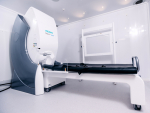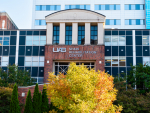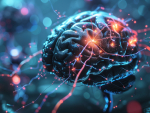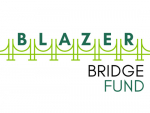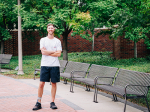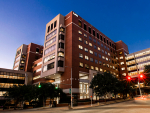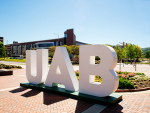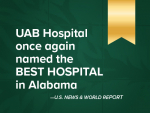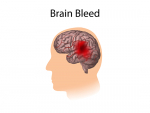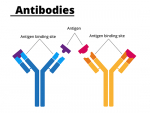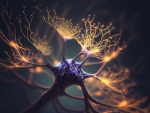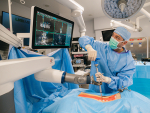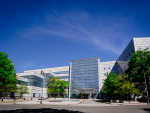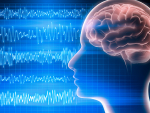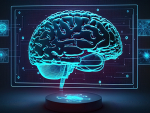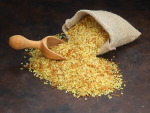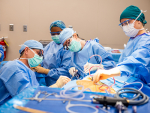Displaying items by tag: department of neurosurgery
UAB was among the first medical centers in the country to obtain a MEG, having done so originally in 2001; however, evolving technology has created a need for replacing the old technology with a new one.
Tagged under
UAB helps meet the needs of adults with spina bifida by providing care as one of the only adult spina bifida clinics in the Southeast.
Tagged under
Halloween ranks as one of the most dangerous days for pedestrians. A UAB expert discusses safety tips, including how to avoid traumatic brain injuries this fright night.
Tagged under
Results suggest that, rather than stimulating both sides of the brain using DBS, unilateral right DBS may avoid DBS-related declines in verbal fluency and response inhibition in patients with movement disorders like Parkinson’s disease.
Tagged under
Blazer Bridge Fund provides financial support to innovative ideas and inventions by the UAB community, encouraging advanced discovery.
Tagged under
- release
- harbert institute for innovation and entrepreneurship
- school of medicine
- school of engineering
- college of arts and sciences
- department of neurosurgery
- department of neurology
- department of mechanical engineering
- department of pediatrics
- department of electrical and computer engineering
- department of dermatology
- department of endocrinology, diabetes, and metabolism
- department of ophthalmology and visual sciences
- department of physics
- artplay
- uab arts
After two months in the hospital, Blake was sent home the day before his 30th birthday. Since Blake has been home, he has continued to attend therapy sessions and take steps to regain his independence.
Tagged under
UAB Medicine has received the American Heart Association’s Get With The Guidelines® - Stroke Gold Plus with the added distinctions of Target: Stroke℠ Honor Roll Elite Plus and Target: Type 2 Diabetes™ Honor Roll.
Research from the centers will help drive new knowledge and foster positive and lasting societal benefits.
Tagged under
For 11 consecutive years, U.S. News has named UAB Hospital the best hospital in Alabama, with several specialties and procedures ranked among the best.
Tagged under
- release
- uab medicine
- uab hospital
- school of medicine
- department of obstetrics and gynecology
- department of neurology
- department of neurosurgery
- department of otolaryngology
- division of gerontology geriatrics and palliative care
- division of pulmonary allergy and critical care medicine
- division of endocrinology diabetes and metabolism
- department of urology
- department of orthopaedics
- division of gastroenterology and hepatology
- division of gastrointestinal surgery
- division of cardiovascular disease
- division of cardiothoracic surgery
- department of orthopaedic surgery
The study will examine a protein that may help slow bleeding in the brain when given within a two-hour window following the first signs of hemorrhage.
Tagged under
The UAB neurosurgery team performed an emergency brain aspiration on Easton Fothergill after he was rushed to UAB Hospital with a large brain abscess.
The site-directed addition of a polymer on the antibody trastuzumab helped this cancer-fighting antibody cross the blood-brain barrier.
Tagged under
Rachel Smith, Ph.D., professor in the UAB School of Engineering and principal investigator in the Neural Signal Processing and Modeling lab, was recently awarded multiple grants to fund research in seizure onset localization.
Tagged under
Tagged under
Cure HHT has named the HHT Clinic at UAB Hospital a Center of Excellence. Only hospitals equipped with the proper personnel, expertise, commitment and resources to provide comprehensive evaluation, treatment and education to individuals with HHT and their families receive this designation.
Tagged under
The resolution, spearheaded by UAB’s Jeffrey Blount, M.D., and the country of Colombia, calls for mandatory folic acid food fortification along with other micronutrients to combat preventable micronutrient deficiencies, such as spina bifida and neural tube defects.
Tagged under
Advanced warning of an elevated risk for seizures could help patients take protective measures to minimize the effects, or possibly even stop the seizure before it begins.
Tagged under
Neuroengineering blends engineering principles with neuroscience to find better ways to treat neurological conditions and to build on understanding how the brain and nervous system function.
Tagged under
UAB pediatric neurosurgeon Jeffrey Blount co-founded the group who presented the resolution on fortification of folic acid in staple foods to the WHO.
Tagged under
Tagged under
